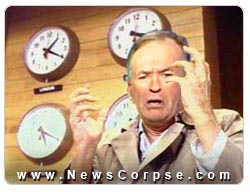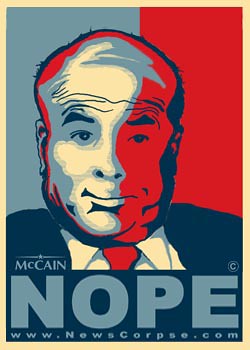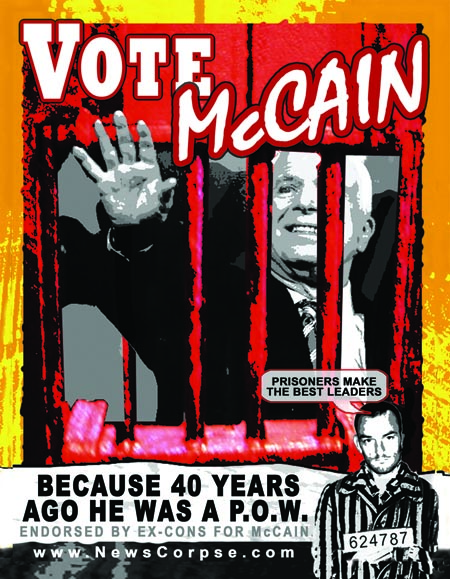Earlier today Michael Wolff of Vanity Fair published his account of a meeting between Rupert Murdoch, Roger Ailes, and Barack Obama, wherein a peace accord was allegedly struck. Then, on tonight’s O’Reilly Factor, Bill O’Reilly announced that he will be interviewing Obama on his program this Thursday. That was fast.
 As the author of Starve The Beast (and this follow up to it), an extended examination of why it is not only pointless, but harmful for Democrats to appear on Fox News, my first reaction was that Obama had capitulated once again to a network that is actively working for his defeat. Under ordinary circumstances, I couldn’t find a reasonable justification for Obama to subject himself to deliberate slander, or for permitting Fox News to leech respect from him that Fox has not earned nor deserves.
As the author of Starve The Beast (and this follow up to it), an extended examination of why it is not only pointless, but harmful for Democrats to appear on Fox News, my first reaction was that Obama had capitulated once again to a network that is actively working for his defeat. Under ordinary circumstances, I couldn’t find a reasonable justification for Obama to subject himself to deliberate slander, or for permitting Fox News to leech respect from him that Fox has not earned nor deserves.
But these are not ordinary circumstances. At the close of the Democrats convention, Obama gave an acceptance speech that electrified 75,000+ people in attendance, as well as 38 million more on television. That is more viewers than watched the finale of American Idol. All of the media buzz was focused on that speech, the convention, and the inspirational glow emanating from Obama. The next day, however, McCain showed up, like the skunk at the party, to introduce his vice presidential candidate. That announcement, as intended, took a lot of the wind from the sails of Obama’s post-conventioneering, first because it was an unexpected choice, and later because the choice was so monumentally stupid it kept making more news every time a new blot leaked out.
Well, turnabout is fair play. The night that Obama has agreed to appear on the Factor is the same night that John McCain will be delivering his acceptance speech at the Republican National Convention. The potential for sparks to fly will surely boost viewership for the program, whether the sparks materialize or not. Obama will have the opportunity to present himself, not just to O’Reilly’s audience, who couldn’t care less, but to the broader audience that will learn of the appearance after the fact. The interview itself will be a front page story. If Obama manages it well, he can turn it into news event that could eclipse McCain’s star turn in St. Paul. Plus O’Reilly plans to serialize the interview over several nights, so the story is automatically extended over multiple news cycles. The Obama team has managed to come up with a stunt that may diminish any bounce that McCain might get from his convention, as McCain did to Obama with the VP affair.
The scope of this broadcast needs to be considered in the context of the television marketplace. The Factor is the most viewed program on the highest rated cable news network. Those ratings historically jump during Republican events like Bush’s State of the Union or Republican conventions. On the final night of the Republican Convention in 2004, Fox beat all broadcast and cable networks in total viewers.
But the beauty of this is not that a lot of Fox viewers will be watching. Fox’s audience is demonstrably unfriendly to Obama and Democrats. A Rasmussen poll found that nine out of ten Fox viewers say that they will vote for McCain. No, the real benefit is that the meeting of these minds (or one mind and one moldy loofah) will be the story itself. And that story will resonate for days. Obama’s courageous venture into the arena of a well known, antagonistic bully, will make for some riveting TV. And for this to occur as McCain has just announced that he is boycotting Larry King (that’s right, Scary Larry) makes it even easier to highlight the differences between these candidates.
Obama needs to go into this interview expecting O’Reilly to have a knife under his coat. He must remain calm, but be prepared to stand up for himself in an adult manner (that alone will throw O’Reilly off). O’Reilly will want this to devolve into a brawl. His questions will contain some substance because his ego will drive him to seek credibility, but he will also touch on minutiae like Rev. Wright, 60’s radicals, and Hillary voters. Obama is smart enough to avoid the traps, but he must stay aware and not let O’Reilly take control. He must be there to promote his agenda, not O’Reilly’s. And he must remember that this interview will be broadcast on McCain’s big night and take full advantage of the opportunity that represents.
If there were ever a time to use a hackneyed TV biz cliche, it’s now: Stay tuned!
Update: For anyone wondering why O’Reilly would book Obama on the same night as McCain’s acceptance speech, the Associated Press sheds some light and confirms that, in this negotiation, Obama dominated the Factor:
“Host Bill O’Reilly acknowledged he’s getting heat from his fans for the timing […] ‘I would have rather had him on next week,’ O’Reilly said. ‘I might not get another shot at this so I better take it.’“


 As the author of
As the author of 
 The bottomless fount of hilarity that is Bill O’Reilly has erupted once again. After MSNBC displayed humorous text on screen during a story about John McCain’s
The bottomless fount of hilarity that is Bill O’Reilly has erupted once again. After MSNBC displayed humorous text on screen during a story about John McCain’s  But it is O’Reilly who is the star of Fox News, and he certainly lives up to his billing. From his now famous “
But it is O’Reilly who is the star of Fox News, and he certainly lives up to his billing. From his now famous “


